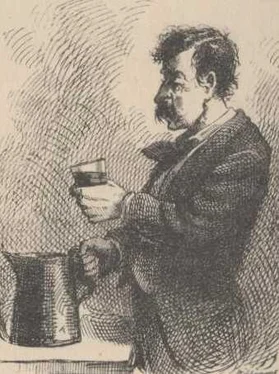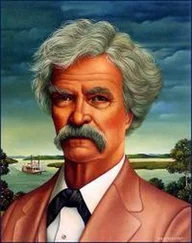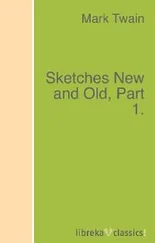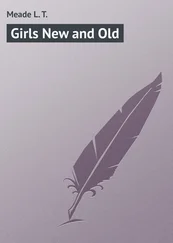Mark Twain - Sketches New and Old
Здесь есть возможность читать онлайн «Mark Twain - Sketches New and Old» весь текст электронной книги совершенно бесплатно (целиком полную версию без сокращений). В некоторых случаях можно слушать аудио, скачать через торрент в формате fb2 и присутствует краткое содержание. Год выпуска: 2004, Жанр: Классическая проза, Юмористическая проза, на английском языке. Описание произведения, (предисловие) а так же отзывы посетителей доступны на портале библиотеки ЛибКат.
- Название:Sketches New and Old
- Автор:
- Жанр:
- Год:2004
- ISBN:нет данных
- Рейтинг книги:5 / 5. Голосов: 1
-
Избранное:Добавить в избранное
- Отзывы:
-
Ваша оценка:
- 100
- 1
- 2
- 3
- 4
- 5
Sketches New and Old: краткое содержание, описание и аннотация
Предлагаем к чтению аннотацию, описание, краткое содержание или предисловие (зависит от того, что написал сам автор книги «Sketches New and Old»). Если вы не нашли необходимую информацию о книге — напишите в комментариях, мы постараемся отыскать её.
Sketches New and Old — читать онлайн бесплатно полную книгу (весь текст) целиком
Ниже представлен текст книги, разбитый по страницам. Система сохранения места последней прочитанной страницы, позволяет с удобством читать онлайн бесплатно книгу «Sketches New and Old», без необходимости каждый раз заново искать на чём Вы остановились. Поставьте закладку, и сможете в любой момент перейти на страницу, на которой закончили чтение.
Интервал:
Закладка:
I said: "Bring him to my lecture. I'll start him for you."
"Oh, if you could but do it! If you could but do it, all our family would bless you for evermore—for he is so very dear to us. Oh, my benefactor, can you make him laugh? can you bring soothing tears to those parched orbs?"
I was profoundly moved. I said: "My son, bring the old party round. I have got some jokes in that lecture that will make him laugh if there is any laugh in him; and if they miss fire, I have got some others that will make him cry or kill him, one or the other." Then the young man blessed me, and wept on my neck, and went after his uncle. He placed him in full view, in the second row of benches, that night, and I began on him. I tried him with mild jokes, then with severe ones; I dosed him with bad jokes and riddled him with good ones; I fired old stale jokes into him, and peppered him fore and aft with red-hot new ones; I warmed up to my work, and assaulted him on the right and left, in front and behind; I fumed and sweated and charged and ranted till I was hoarse and sick and frantic and furious; but I never moved him once—I never started a smile or a tear! Never a ghost of a smile, and never a suspicion of moisture! I was astounded. I closed the lecture at last with one despairing shriek—with one wild burst of humor, and hurled a joke of supernatural atrocity full at him!
Then I sat down bewildered and exhausted.
The president of the society came up and bathed my head with cold water, and said: "What made you carry on so toward the last?"
I said: "I was trying to make that confounded old fool laugh, in the second row."
And he said: "Well, you were wasting your time, because he is deaf and dumb, and as blind as a badger!"
Now, was that any way for that old man's nephew to impose on a stranger and orphan like me? I ask you as a man and brother, if that was any way for him to do?
THE OFFICE BORE
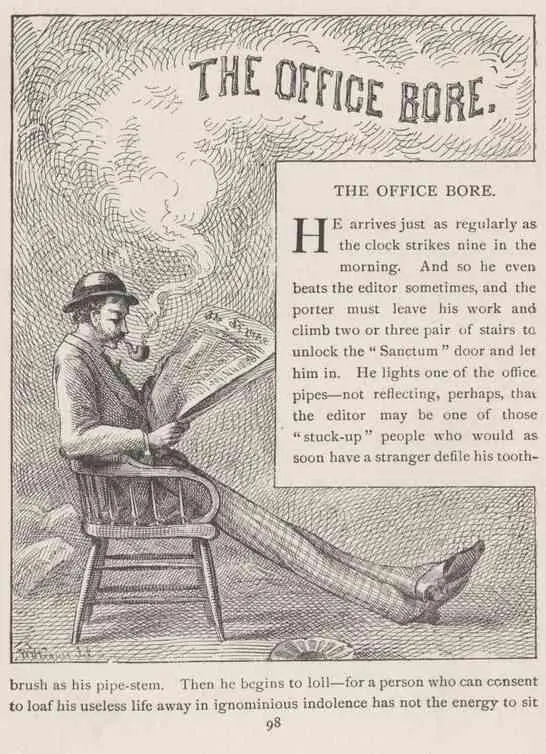
He arrives just as regularly as the clock strikes nine in the morning. And so he even beats the editor sometimes, and the porter must leave his work and climb two or three pairs of stairs to unlock the "Sanctum" door and let him in. He lights one of the office pipes—not reflecting, perhaps, that the editor may be one of those "stuck-up" people who would as soon have a stranger defile his tooth-brush as his pipe-stem. Then he begins to loll—for a person who can consent to loaf his useless life away in ignominious indolence has not the energy to sit up straight. He stretches full length on the sofa awhile; then draws up to half length; then gets into a chair, hangs his head back and his arms abroad, and stretches his legs till the rims of his boot-heels rest upon the floor; by and by sits up and leans forward, with one leg or both over the arm of the chair. But it is still observable that with all his changes of position, he never assumes the upright or a fraudful affectation of dignity. From time to time he yawns, and stretches, and scratches himself with a tranquil, mangy enjoyment, and now and then he grunts a kind of stuffy, overfed grunt, which is full of animal contentment. At rare and long intervals, however, he sighs a sigh that is the eloquent expression of a secret confession, to wit "I am useless and a nuisance, a cumberer of the earth." The bore and his comrades—for there are usually from two to four on hand, day and night—mix into the conversation when men come in to see the editors for a moment on business; they hold noisy talks among themselves about politics in particular, and all other subjects in general—even warming up, after a fashion, sometimes, and seeming to take almost a real interest in what they are discussing. They ruthlessly call an editor from his work with such a remark as: "Did you see this, Smith, in the Gazette?" and proceed to read the paragraph while the sufferer reins in his impatient pen and listens; they often loll and sprawl round the office hour after hour, swapping anecdotes and relating personal experiences to each other—hairbreadth escapes, social encounters with distinguished men, election reminiscences, sketches of odd characters, etc. And through all those hours they never seem to comprehend that they are robbing the editors of their time, and the public of journalistic excellence in next day's paper. At other times they drowse, or dreamily pore over exchanges, or droop limp and pensive over the chair-arms for an hour. Even this solemn silence is small respite to the editor, for the next uncomfortable thing to having people look over his shoulders, perhaps, is to have them sit by in silence and listen to the scratching of his pen. If a body desires to talk private business with one of the editors, he must call him outside, for no hint milder than blasting-powder or nitroglycerin would be likely to move the bores out of listening-distance. To have to sit and endure the presence of a bore day after day; to feel your cheerful spirits begin to sink as his footstep sounds on the stair, and utterly vanish away as his tiresome form enters the door; to suffer through his anecdotes and die slowly to his reminiscences; to feel always the fetters of his clogging presence; to long hopelessly for one single day's privacy; to note with a shudder, by and by, that to contemplate his funeral in fancy has ceased to soothe, to imagine him undergoing in strict and fearful detail the tortures of the ancient Inquisition has lost its power to satisfy the heart, and that even to wish him millions and millions and millions of miles in Tophet is able to bring only a fitful gleam of joy; to have to endure all this, day after day, and week after week, and month after month, is an affliction that transcends any other that men suffer. Physical pain is pastime to it, and hanging a pleasure excursion.
JOHNNY GREER
"The church was densely crowded that lovely summer Sabbath," said the Sunday-school superintendent, "and all, as their eyes rested upon the small coffin, seemed impressed by the poor black boy's fate. Above the stillness the pastor's voice rose, and chained the interest of every ear as he told, with many an envied compliment, how that the brave, noble, daring little Johnny Greer, when he saw the drowned body sweeping down toward the deep part of the river whence the agonized parents never could have recovered it in this world, gallantly sprang into the stream, and, at the risk of his life, towed the corpse to shore, and held it fast till help came and secured it. Johnny Greer was sitting just in front of me. A ragged street-boy, with eager eye, turned upon him instantly, and said in a hoarse whisper
"'No; but did you, though?'
"'Yes.'
"'Towed the carkiss ashore and saved it yo'self?'
"'Yes.'
"'Cracky! What did they give you?'
"'Nothing.'
"'W-h-a-t [with intense disgust]! D'you know what I'd 'a' done? I'd 'a' anchored him out in the stream, and said, Five dollars, gents, or you carn't have yo' nigger.'"
THE FACTS IN THE CASE OF THE GREAT BEEF CONTRACT
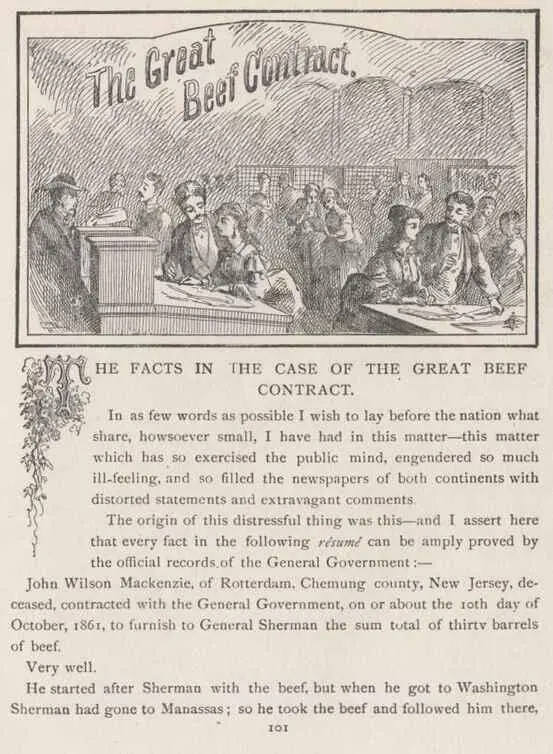
In as few words as possible I wish to lay before the nation what share, howsoever small, I have had in this matter—this matter which has so exercised the public mind, engendered so much ill-feeling, and so filled the newspapers of both continents with distorted statements and extravagant comments.
The origin of this distressful thing was this—and I assert here that every fact in the following résumé can be amply proved by the official records of the General Government.
Читать дальшеИнтервал:
Закладка:
Похожие книги на «Sketches New and Old»
Представляем Вашему вниманию похожие книги на «Sketches New and Old» списком для выбора. Мы отобрали схожую по названию и смыслу литературу в надежде предоставить читателям больше вариантов отыскать новые, интересные, ещё непрочитанные произведения.
Обсуждение, отзывы о книге «Sketches New and Old» и просто собственные мнения читателей. Оставьте ваши комментарии, напишите, что Вы думаете о произведении, его смысле или главных героях. Укажите что конкретно понравилось, а что нет, и почему Вы так считаете.
